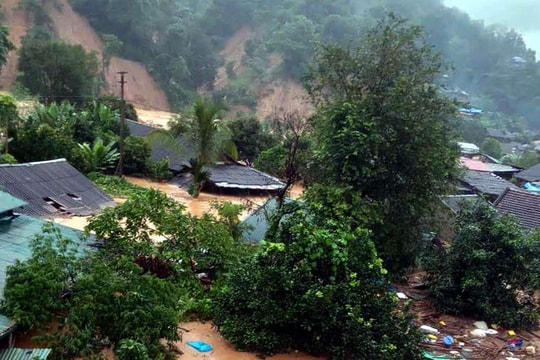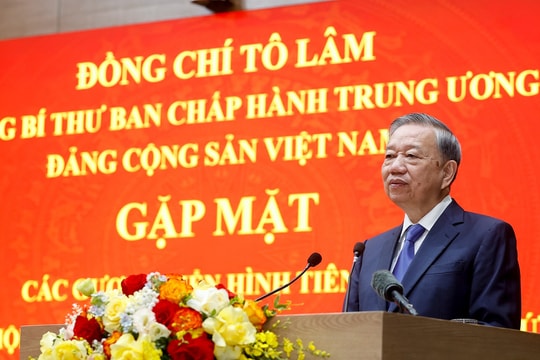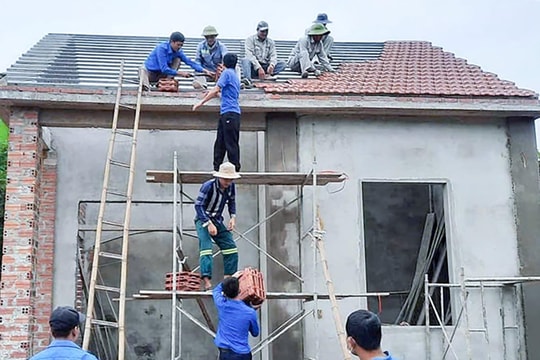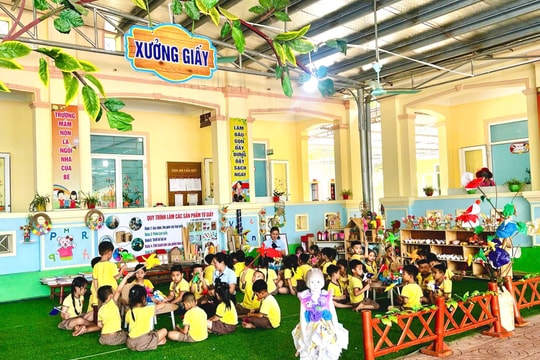Chairman of the Provincial People's Council: 'Propose to temporarily stop replicating the new VNEN school model'
(Baonghean.vn) - On the afternoon of December 15, a representative of the Department of Education and Training answered voters' questions about applying the VNEN model and socializing education.
» VNEN in Nghe An: Some praise, some criticize - Why?
» VNEN School in Nghe An: All kinds of problems
Before answering questions, Ms. Nguyen Thi Kim Chi - Director of the Department of Education and Training presented a report explaining two areas: implementing the new VNEN school model and promoting socialization in schools.
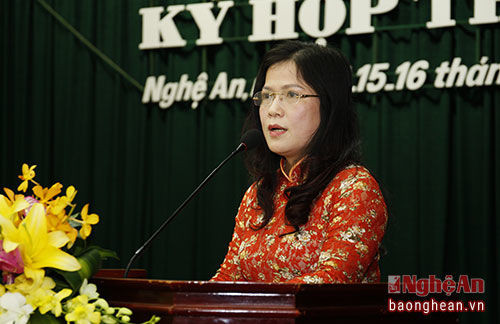 |
| Delegate Nguyen Thi Kim Chi - Director of the Department of Education and Training answered questions. |
Regarding the implementation of the new school model according to the VNEN model in 73 schools implementing the Project with 1,047 classes, 27,030/191,252 students from grades 2 to 5; 26 secondary schools implementing in 65 grades 6 with 2,014 secondary school students in the province, Ms. Kim Chi presented the contents of the direction work, the advantages as well as the difficulties and advantages when applying teaching according to the VNEN model in Nghe An.
Delegate Nguyen Thi Kim Chi said that this is a major policy of the Ministry of Education and Training and must be implemented. The core of the VNEN model is comprehensive innovation in education and training. The Department has implemented effective steps and guidelines for educational institutions in the spirit of student progress.
Besides the advantages such as students studying under the new pilot school model showing more courage and confidence in dealing with life situations, there are still shortcomings and objections from parents and schools.
Regarding the cause, Ms. Nguyen Thi Kim Chi said that it was mainly due to the crowd mentality and the exam mentality of parents and people. Communication work was sometimes ineffective. The representative of the Department of Education and Training said that it was necessary to learn from experience in organizing and disseminating policies; training and fostering staff; guiding, inspecting, urging; and communicating to create social consensus.
The proposed solution is to continue to direct pilot schools to make reasonable adjustments to teaching organization and student assessment based on the school's conditions and the ability of the teaching staff; promote the effectiveness of the model, find ways to overcome difficulties and limitations; train teachers; advise and support teaching and educational conditions to ensure that students in schools implementing the VNEN model study in the most favorable environment possible...
Regarding the socialization of education, delegate Nguyen Thi Kim Chi said that from the 2011-2012 school year to the end of the 2015-2016 school year, 837 billion VND had been mobilized to build and upgrade school facilities, and in the 2015-2016 school year alone, 228.7 billion VND had been mobilized (the highest amount collected for school construction was only 63 billion VND/school year). The process of managing and using the funding sources thoroughly followed the principles: Voluntary, for the right purpose; democratic, public, transparent. However, there are still some shortcomings and limitations, and there is still a situation of over-collection due to a number of reasons.
A series of questions about VNEN
Delegate Dinh Thi An Phong - Nghi Loc unit asked: In the report of Nguyen Trai Primary School, the quality was clearly improved but parents protested. According to her, why is there this contradiction? What are the causes and solutions? Teaching according to this model requires many conditions, while there are many shortcomings in terms of facilities, teachers, learning materials, too many students, and the consensus of parents.
Currently, in many places in the province there are still classrooms lacking, teacher training is still sketchy, parents do not agree... so voters think that the reality of the province is not suitable for implementing this teaching model. What do you think about the voters' opinions? As a leader of the industry, in your opinion, should the industry advise and decide to teach according to this new model in the coming time? As a department director, are you responsible for the quality of teaching and learning according to the new model? Currently, there are still many violations in the implementation of school fees, could you please tell us the causes and solutions? When will the over-collection and incorrect collection of fees end?
Delegate Phan Thi Thanh Thuy, Thai Hoa unit asked: The shortcomings of the self-governing council model are forced and inappropriate. Is the information about uneven seating, attendance, and insufficient textbooks correct? During the pilot phase, there was financial support, but after stopping, there is no support, so how will it be implemented? Is the Department's opinion that this model should be stopped or not?
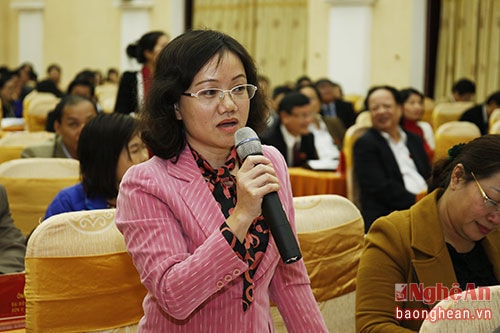 |
| Delegate Thai Thi An Chung asked: The Department's report has not analyzed the negative aspects of the VNEN model. Has the Department analyzed and communicated those limitations to parents? The Central Government has directed proactive research, so what positive elements has the Department researched and how will it be implemented? |
Delegate Luc Thi Lien - Quy Chau unit asked: Many opposing opinions say that only good students can access the model well, the report has pointed out the shortcomings. Especially in the mountainous areas, 1 school has only 2 teachers attending training, students' awareness is still poor, they cannot speak the common language clearly. Therefore, request the Department to inform whether applying this model in the mountainous areas is appropriate or not? What solutions have been provided to support schools and teachers in the mountainous areas?
Delegate Nguyen Thi Lan - Do Luong unit stated: The Department has advised the Provincial People's Committee on many solutions to rectify extra learning and extra teaching, however, through the implementation of the VNEN model in schools, there has been a situation of extra tutoring in the afternoon for students due to concerns that students do not grasp the lessons in class? What is your opinion on this issue? According to you, the implementation is synchronous, but through the survey, it shows that it is not as synchronous as in Hoang Ta Thon Secondary School; the books are also not complete as in Nghi Lam Secondary School. Through the collective petition of parents of Hung Dung Secondary School, it is also because they do not understand the process? How do you explain this issue?
Delegate Nguyen Huu Cau asked: The Department's response to the VNEN model is contrary to the response according to the Ministry of Education and Training's dispatch to the National Assembly delegates: encouraging on a voluntary basis, selecting positive factors; applying other advanced models for application. I request the Department to clarify this issue? Regarding extra teaching, extra learning, and overcharging, as a leader of the industry, how many units and individuals have you advised the province to inspect and examine, and how many have you handled?
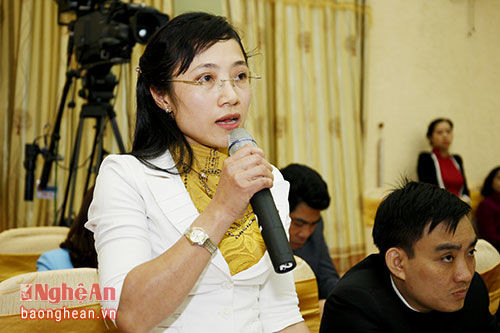 |
| Delegate Dinh Thi An Phong - Nghi Loc unit raised 3 questions about the shortcomings of the VNEN model. |
Director of Department of Education and Training explains
Responding to questions from delegates, Ms. Nguyen Thi Kim Chi said: The issues mentioned by delegates are also concerns of the industry, but with the task of innovation, it is impossible not to do so. In principle, the VNEN model is good, the important thing is whether it is implemented appropriately or not. In terms of conditions, the VNEN model does not require too much, but basically has a classroom with equipment similar to a normal classroom.
There are still difficulties in student numbers. Right from the beginning of the implementation, the department selected schools with student numbers below the standard. Two schools in Vinh City as well as primary schools in Vinh City did not meet the standards, but since a city unit could not implement innovation, the department had to reluctantly choose to allow the schools to implement.
As for teachers, they all meet the training standards. However, to teach according to this model, teachers must be good, dedicated, and responsible, so in Vinh City schools, the school authority has directed schools to select good teachers to arrange to teach classes applying the new model.
Regarding the documents, there are differences. With the VNEN model, textbooks are integrated and compiled differently, but the curriculum framework and knowledge standards are the same. As for the teaching methods, the school has its own preparation for the remaining documents (workbooks, instructions).
Regarding the objections of parents of Nguyen Trai Primary School, Ms. Kim Chi said: this school ranked 4th out of 7 best schools in the city, test scores were higher than the average of the province. The Department and the school have reported to the parents about the quality but the parents are still not satisfied so they will continue to patiently explain.
Ms. Nguyen Thi Kim Chi reported: For schools implementing the VNEN Project in the period of 2013 - 2016, 97.7% of managers and teachers of these schools proposed to continue maintaining the models of the Project; 70/73 schools proposed to continue implementing all components of the Project; 03 schools proposed to only implement a part, not using the Project's documents in teaching and learning (Nguyen Trai Primary School - Vinh City, Nghia Dan Town Primary School, Nghia Dan District, Tien Phong 2 Primary School, Que Phong District). For the remaining schools (470 schools), 421 primary schools registered to implement the components of the new school model, a rate of 89.5%. Regarding parents' opinions: There are 2 schools where the majority of parents request to teach according to the current documents (Nguyen Trai Primary School and Nghia Dan Town Primary School). In the remaining schools, the majority of parents request to continue to maintain or respect the school's choice. |
Regarding the shortcomings of VNEN, what are the difficulties, Ms. Kim Chi said: Although the material facilities have been adjusted, they are not really suitable, but to meet this condition is force majeure. As for the quality of students, some study well, some study poorly, that is a normal phenomenon, no matter which model they study, they will show the same. However, studying under the new model, students will develop their qualities. The Department also requires teachers to tutor and care for students so that there are no weak students and continue to research and direct to overcome limitations.
Regarding teacher training, the Department has done a very full job every year; invited the Ministry's Secondary Education Department to train Le Loi Secondary School and some other schools. However, if there is a lack of self-training and professional activities in the school, it will not be very effective. The Department will strengthen training and promote the spirit of self-training.
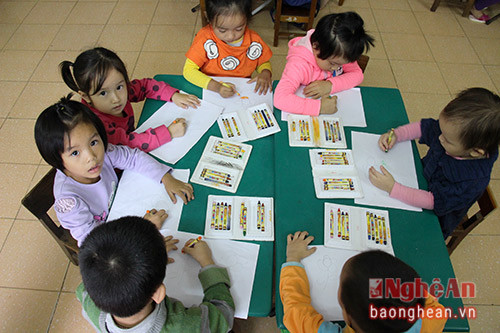 |
| Class time of children at Nghi Lien Kindergarten, Vinh City |
In response to Ms. Luc Thi Lien's question, Ms. Kim Chi said that implementing VNEN in mountainous areas is quite good in terms of community integration, such as at Nam Can Ky Son Primary School. The Department was very careful in selecting schools in mountainous areas this school year to implement it. Studying this program is in line with the program framework. Responding to the opinions of delegates Nguyen Nhu Khoi and Pham Van Hoa, Ms. Kim Chi acknowledged and suggested implementing the correct decentralization, handing over the responsibility of mobilizing socialized education to the government, however, the school can implement some small items related to the school.
In response to Ms. Lan's question, delegate Kim Chi said that tutoring for students only happens in a few places, especially Vinh City; mainly because parents are too concerned about their children, wondering about the effectiveness and implementation roadmap as well as the examination process. The department will review and make adjustments to this issue. Regarding the examination process, the department will follow the direction of the Ministry of Education and Training. If you study well, you can take the entrance exam to Phan Boi Chau Specialized School.
The leaders of the Department of Education and Training said that, regarding the conditions to continue maintaining and expanding the model, with 73 schools implementing the project in the 2013 - 2016 period, all of these schools are qualified to continue maintaining the model: 100% of schools have enough classrooms to study 2 sessions/day; classrooms are decorated according to instructions; 100% of schools have enough standard desks and chairs, enough shared materials provided by the Project, enough teachers to implement; the average number of students in these schools is low compared to the regulations of the Ministry. There are only 2 schools in Vinh City with over 35 students per class, namely Nguyen Trai Primary School with 36 students per class and Hung Dung Primary School with 38 students per class. For the new secondary school model, the Department of Education and Training has directed the issuance of documents guiding registration and implementation in the spirit of step-by-step, voluntary, meeting the model requirements, suitable to the characteristics of the schools. Directing the Departments of Education and Training to do a good job of propaganda and socialization of education, gradually creating consensus among teachers, parents and society in the process of implementing the new school model. |
Responding to Mr. Nguyen Huu Cau's question, Ms. Kim Chi said that 71 of the 73 schools agreed to continue implementation when evaluated. Of the remaining 470 schools, 421 applied to register with appropriate components. The organization and documents depend on the school. At this time, the Ministry of Education and Training has not said that there is any new model to replace it, so there is no direction yet. There are some schools that, after a period of implementation, asked not to participate, the Department has also accepted. Regarding overcharging and extra teaching and learning, the Department attaches great importance to inspection work, and from September every year there is a specialized inspection plan. However, it is not possible to inspect all of them. In 2016, 9 districts were inspected and a document was sent to the districts requesting handling of violating primary and preschool schools.
In the coming time, with the positives that have been seen and the shortcomings that the industry has implemented, Ms. Kim Chi said that the department has given completely correct instructions and encouraged schools to apply the model voluntarily. Schools that have implemented it will continue to promote its effectiveness, while the remaining schools will apply the positive elements of the model. Appropriate solutions will be applied and flexibly applied. Unsuitable elements will not be implemented.
Many concerns about socialization in schools
Delegate Nguyen Nhu Khoi asked: What is the Department of Education and Training's viewpoint on handling violations in school revenue and expenditure and in the socialization of education?
Delegate Tran Van Huong asked: The model has only been implemented at primary and secondary schools, so is it suitable for higher levels? When the project funding ends, will the state invest or mobilize social resources? The management of revenues is decentralized, but the handling of violations is assigned to the district?
Regarding overcharging in schools, Ms. Kim Chi asked to accept and promptly correct it. Although at the beginning of each school year, the Department has issued guidance documents and inspection and examination teams. The reason is due to limited investment costs for education. In schools, there are only 3 collections, the rest are voluntary and agreed collections. Management has been decentralized, but with thousands of educational institutions implementing it, it has not been fully controlled. In the socialization policy, there are also unreasonable policies and sanctions.
Regarding revenue and expenditure management in schools, the Department can only ensure 3 steps: full guidance, inspection and emulation and classification. If there are individuals or establishments that violate, they will be strictly handled and sent official dispatches to the districts to handle the violations.
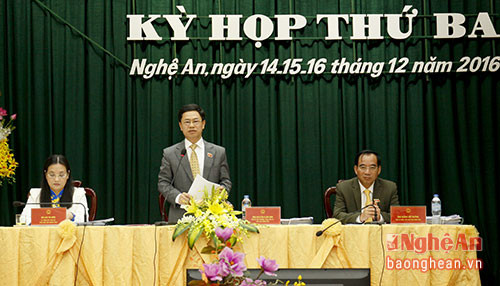 |
| Mr. Nguyen Xuan Son - Standing Deputy Secretary of the Provincial Party Committee, Chairman of the Provincial People's Council proposed to temporarily stop replicating the VNEN model in the area. |
Proposal to temporarily stop replicating the VNEN model
Through questioning, it was found that there were still many shortcomings in applying the new school model, so the chairman of the session, Mr. Nguyen Xuan Son - Standing Deputy Secretary of the Provincial Party Committee, Chairman of the Provincial People's Council, proposed to temporarily stop replicating this model in the province, respecting the principle of voluntariness. If any school implements it, it is necessary to ensure that all conditions for implementation are met. For schools that have implemented it, all levels and sectors need to objectively evaluate it, draw out good elements to promote, and minimize shortcomings.
Regarding the socialization of education, what voters are concerned about is the mobilization of parents in schools. Although socialization has contributed a lot to the construction of school facilities, at the beginning of each school year, parents are concerned and worried about overcharging and improper use.
Therefore, Mr. Nguyen Xuan Son suggested reviewing the guidance on implementing socialized revenue and expenditure to see if it is complete and scientific. It is necessary to thoroughly organize and disseminate it so that all levels and sectors can implement it correctly. It is recommended that the mobilization of contributions must ensure the principle of voluntariness, not imposition, and must strictly follow the 4-step process. It is recommended to strengthen the inspection and supervision of socialized contributions and identify this as the work of many levels and sectors. I hope that the Provincial People's Committee and the sector will continue to direct to meet the wishes of voters on these two contents.
PV Group
You can send your comments to the 3rd Session of the 17th Provincial People's Council here.
[council_conference]

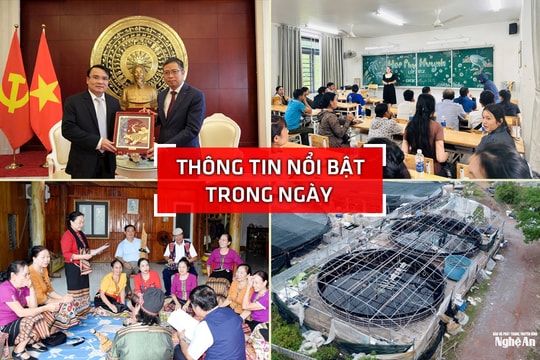
.jpg)
